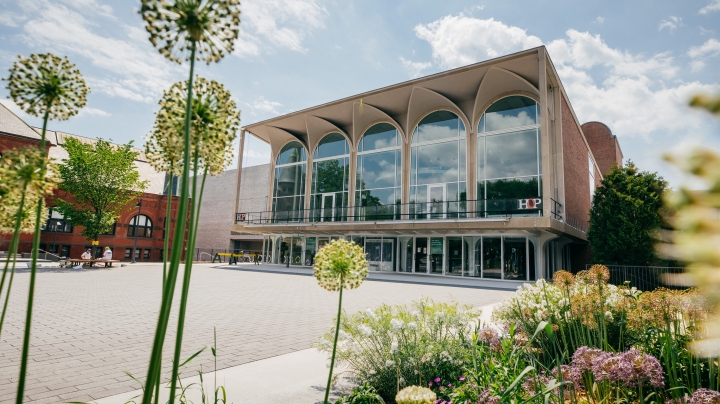Creating compelling theater, film, visual art, or music is never easy, but the pandemic placed unprecedented hurdles in the paths of student artists, who were celebrated recently in a virtual ceremony.
“Those of you who are being honored here today found new and lasting ways to create, to keep us together, and to develop new ideas and artistic expressions,” said Mary Lou Aleskie, the Howard L. Gilman ’44 Director of the Hopkins Center for the Arts, at the May 25 event. “You shaped how we experience our world by adapting to new modes of creation, never stopping, not only achieving artistic successes, but making your work accessible and available to friends, family, and audiences around the globe. Thank you for your vision, tenacity, and talents.”
President Philip J. Hanlon ’77 thanked the student artists for “harnessing the power of technology to broaden your reach. You brought radical joy during this pandemic year to all who watched and engaged with your work.”
Provost Joseph Helble commended the 70 awardees for “what I, as an engineer, like to call ‘creativity in the face of constraint.’ You’ve continually reminded us all of the value of experimentation, and whether it was the wind ensemble, the marching band, the Dartmouth Symphony Orchestra, or the dance ensemble, working through masks, distancing, and hybrid virtual formats, you made it happen.”
COVID-19 restrictions did not stop art in its tracks, Helble said. “A hundred students participated in theater productions and 450 made at-home crafts through the different studios. This year, 19 students were Hop fellows. And for Dartmouth Idol, 50 of you submitted audition videos. You are making it happen for all of us this year.”
In short videos recorded from their homes and offices, professors of theater, music, film and media studies, and visual art named and congratulated each awardee, many of whom received more one commendation. The final award, the Sudler Prize in the Arts, is normally reserved for one recipient of the Marcus Heiman-Martin R. Rosenthal ’56 Achievement Award in the Creative Arts. This year, because of what Aleskie called the “extraordinary creativity of all of our Heiman-Rosenthal cohort,” the Sudler prize went to all 10 students:
- Kate Budney ’21 (Theater)
- Natalie Dameron ’21 (Film and Media Studies)
- Yijin (Brandy) Zhang ’22 (Music)
- Phoebe Quin Kong ’21 (Studio Art)
- Lexi Warden ’21 (Ensemble, Dance)
- Colin Goodbred ’21 (Ensembles, Dance)
- Noah James Campbell ’21 (Ensembles, Instrumental)
- Arviso Alvord ’20 (Ensembles, Vocal)
- Jessica W. Zhang ’21 (Student Workshops, Jewelry)
- Lucas David James ’21 (Arts Administration)
Tracey Deer ’00, a Mohawk writer, director, and showrunner, brought the ceremony to a close with inspiration and advice. Deer’s award-winning documentaries with Indigenous-owned Rezolution Pictures led to the acclaimed dramedy Mohawk Girls, which ran for five seasons on the Aboriginal Peoples Television Network. As its co-creator, director, and co-showrunner, Deer earned four consecutive Canadian Screen Award nominations for best direction and the TIFF Birks Diamond Tribute Award, propelling her to co-executive producer for a season of the Netflix/CBC series Anne with an E.
Deer’s debut feature, Beans, was shown in May by special arrangement with the Hop. Recalling her time at Dartmouth, where she said her “crazy” wish to be a filmmaker “was never considered crazy,” Deer advised student artists to break through barriers and stereotypes.
“As a storyteller, as a woman—a Mohawk woman—who for so many years was always being told what I can’t do, where I can’t go, who I can’t be, I grew up very much feeling like I was being squashed in a box,” Deer said. “My entire journey to and into myself has been about breaking out of that box. So if anyone told me I can’t do something, that would fuel the fire in me to say, yes, I can.”
Deer urged the students to “beware of fear-based thinking,” to choose their collaborators carefully, and to take care of themselves. “I made it happen, and I want all of you to know that anything is possible,” she said. “I am so excited for all of you for the road, the winding road, you’re all about to take. And as long as you stay focused on the vision that you have for yourself and for your career, you’ll get there.”


